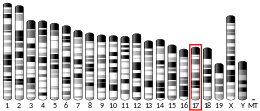FGFR1OP
FGFR1 oncogene partner is a protein that in humans is encoded by the FGFR1OP gene.[5][6][7]
Function
This gene encodes a largely hydrophilic protein postulated to be a leucine-rich protein family member. A t(6;8)(q27;p11) chromosomal translocation, fusing this gene and the fibroblast growth factor receptor 1 (FGFR1) gene, has been found in cases of myeloproliferative disorder. The resulting chimeric protein contains the N-terminal leucine-rich region of this encoded protein fused to the catalytic domain of FGFR1. This gene is thought to play an important role in normal proliferation and differentiation of the erythroid lineage. Alternatively spliced transcript variants that encode different proteins have been identified.[7]
gollark: ++remind 20h http://www.amazon.com/gp/product/0312680465?ie=UTF8&tag=bldgblog-20&linkCode=as2&camp=1789&creative=390957&creativeASIN=0312680465
gollark: ++remind 11h pete
gollark: ++remind 12h BEE you, STEP
gollark: https://www.painscience.com/articles/stretching.php
gollark: https://hackaday.com/2021/03/27/image-sensors-demystified-by-imsai-guy/#comments
References
- GRCh38: Ensembl release 89: ENSG00000213066 - Ensembl, May 2017
- GRCm38: Ensembl release 89: ENSMUSG00000069135 - Ensembl, May 2017
- "Human PubMed Reference:". National Center for Biotechnology Information, U.S. National Library of Medicine.
- "Mouse PubMed Reference:". National Center for Biotechnology Information, U.S. National Library of Medicine.
- Popovici C, Zhang B, Grégoire MJ, Jonveaux P, Lafage-Pochitaloff M, Birnbaum D, Pébusque MJ (February 1999). "The t(6;8)(q27;p11) translocation in a stem cell myeloproliferative disorder fuses a novel gene, FOP, to fibroblast growth factor receptor 1". Blood. 93 (4): 1381–9. PMID 9949182.
- Reither A, Hehlmann R, Goldman JM, Cross NC (April 1999). "[The 8p11 myeloproliferative syndrome]". Medizinische Klinik. 94 (4): 207–10. PMID 10373756.
- "Entrez Gene: FGFR1OP FGFR1 oncogene partner".
Further reading
- Guasch G, Ollendorff V, Borg JP, Birnbaum D, Pébusque MJ (December 2001). "8p12 stem cell myeloproliferative disorder: the FOP-fibroblast growth factor receptor 1 fusion protein of the t(6;8) translocation induces cell survival mediated by mitogen-activated protein kinase and phosphatidylinositol 3-kinase/Akt/mTOR pathways". Molecular and Cellular Biology. 21 (23): 8129–42. doi:10.1128/MCB.21.23.8129-8142.2001. PMC 99978. PMID 11689702.
- Guasch G, Delaval B, Arnoulet C, Xie MJ, Xerri L, Sainty D, Birnbaum D, Pébusque MJ (January 2004). "FOP-FGFR1 tyrosine kinase, the product of a t(6;8) translocation, induces a fatal myeloproliferative disease in mice". Blood. 103 (1): 309–12. doi:10.1182/blood-2003-05-1690. PMID 12969958.
- Andersen JS, Wilkinson CJ, Mayor T, Mortensen P, Nigg EA, Mann M (December 2003). "Proteomic characterization of the human centrosome by protein correlation profiling". Nature. 426 (6966): 570–4. doi:10.1038/nature02166. PMID 14654843.
- Brill LM, Salomon AR, Ficarro SB, Mukherji M, Stettler-Gill M, Peters EC (May 2004). "Robust phosphoproteomic profiling of tyrosine phosphorylation sites from human T cells using immobilized metal affinity chromatography and tandem mass spectrometry". Analytical Chemistry. 76 (10): 2763–72. doi:10.1021/ac035352d. PMID 15144186.
- Yan X, Habedanck R, Nigg EA (February 2006). "A complex of two centrosomal proteins, CAP350 and FOP, cooperates with EB1 in microtubule anchoring". Molecular Biology of the Cell. 17 (2): 634–44. doi:10.1091/mbc.E05-08-0810. PMC 1356575. PMID 16314388.
- Mikolajka A, Yan X, Popowicz GM, Smialowski P, Nigg EA, Holak TA (June 2006). "Structure of the N-terminal domain of the FOP (FGFR1OP) protein and implications for its dimerization and centrosomal localization". Journal of Molecular Biology. 359 (4): 863–75. doi:10.1016/j.jmb.2006.03.070. PMID 16690081.
- Mano Y, Takahashi K, Ishikawa N, Takano A, Yasui W, Inai K, Nishimura H, Tsuchiya E, Nakamura Y, Daigo Y (December 2007). "Fibroblast growth factor receptor 1 oncogene partner as a novel prognostic biomarker and therapeutic target for lung cancer". Cancer Science. 98 (12): 1902–13. doi:10.1111/j.1349-7006.2007.00610.x. PMID 17888034.
This article is issued from Wikipedia. The text is licensed under Creative Commons - Attribution - Sharealike. Additional terms may apply for the media files.





